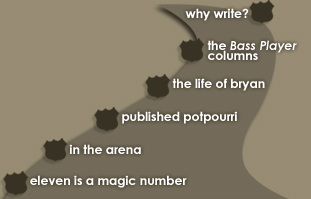THE
PERFECT TRIANGLE
bryan beller (03.05.01)
It
is now beyond fashionable to trash Bill Clinton in totality. The words
being used to describe him are agonizingly close to the caricature
previously only painted publicly by the likes of Rush Limbaugh, Bob
Barr, Tom DeLay, etc. - and they're being spoken by Democrats ranging
from Jimmy Carter to Jimmy Carville. It's mainstreamed to the point
that Dan Burton - he of "Bill Clinton killed Vince Foster" fame -
can hold Pardonscam hearings and be portrayed (accurately, I hate
to say) by moderate conservative columnist Andrew Sullivan as the
broken clock who's right twice a day. From all across the spectrum,
you can hear the collective voice of complete rejection. He did nothing.
He was nothing. His legacy is Monica, cigars, pardons, and a Republican
majority in Congress.
But look deeper. The moral legacy left by Clinton is laughable, but
what of the political legacy? At the most basic level, every topic
on the Washington table can be boiled down to cold, hard political
reality. I never did write a column about Florida, but if I had, its
essence would have been this: winning trumps ideology, every time.
That's why conservatives were busy reconstructing the 14th Amendment's
equal protection clause and liberals were rediscovering states' rights
and strict adherence to statute (hopelessly flawed as it was in Florida's
case). The Big Prize was at stake and, for six harrowing weeks, literally
up for grabs. You ever wonder what goes on at the bottom of a rugby
scrum? Now you know.
And so W comes out with the ball in his hands. And he talks of reconciliation.
And he goes to visit the Democrats' private caucus. And he gives them
nicknames. And he appoints a mostly moderate cabinet. (OK, there was
that guy Ashcroft, but the Dems practically made him swear under oath
not to be himself by making him proclaim Roe v. Wade to be
the accepted law of the land. Did you notice where Bush was during
the Ashcroft confirmation hearings? You guessed it - the ranch in
Crawford, Texas, presumably happy to be without cable television.
It would at least appear that bones thrown to the right wing have
to do their own heavy lifting in this administration.)
Bush wasn't done. He met with the Congressional Black Caucus. He invited
Democratic Congressmen and Senators alike to the White House for face
time and photo ops. Then, with the Dems dazed and confused like a
drunk, smitten schoolgirl, and Clinton in the process of self-immolation,
Bush took to center stage for a prime time address of a joint session
of Congress, and spoke words that betrayed Bill Clinton's true legacy:
"Year after year in Washington, budget debates seem to come down to
an old, tired argument: on one side, those who want more government,
regardless of the cost; on the other, those who want less government,
regardless of the need. We should leave those arguments to the last
century, and chart a different course."
Triangulation la perfecta. Dick Morris must have been spinning
in his Fox News chair. It wasn't just a play out of the Clinton playbook
- it was the playbook. Bush went on to spend nearly thirty
minutes embracing every Democratic issue you can think of: increased
funding for public education, Social Security and Medicare; a patients'
bill of rights; prescription drug benefits for seniors; expanded benefits
for Americans with disabilities. He even instructed Attorney General
Ashcroft to get to the bottom of racial profiling! (Ashcroft must
be feeling like Job by now, first having lost his Senate seat to a
dead man, and now finding himself Head Conservative in Charge of Causes
Conservatives Detest.) Bush drove down the middle so ferociously,
why, even ultra-liberal Rep. Sheila Jackson Lee - a woman who walked
out of Congress during Bush's official Electoral College victory on
January 6 - hugged him afterwards. Oh, also, there was something in
there about a $1.6 trillion tax cut. Some piffle about top rates coming
down six points, even for billionaires.
It's a winning strategy, to rip the ideological teeth from your opponents'
argument by agreeing with him when he's shouting from the rooftops.
W knows, because that's how Clinton beat his father. Sure, Bill was
tough on George Sr. during the '92 campaign, but it's all too easy
to forget that balancing the budget, reforming welfare, and espousing
personal and familial responsibility were exclusively GOP issues up
until the very moment the "New Democrat" was born.
Why was it possible? The end of the Cold War defanged one of the most
polarizing political issues of the past forty years. The battle of
how best to deal with the Soviet Union encapsulated moral, economic,
and pure ideological conflict into a single, neat, superheated little
package. In 1984, a Democratic moderate would likely have been torn
in two by being forced to support either the massive defense buildup
or the nuclear freeze movement. In hardball economic terms, it was
money for missiles vs. money for Medicare (forget for a moment that
everyone eventually chose both, increasing spending across the board
and giving birth to the deficit that would dominate the politics of
the next decade). These were life and death national security issues;
there wasn't a lot of room for fancy geometric positioning.
Not so in post-Cold War economics, and certainly not so in 1992. Suddenly
there were more "moderate" (read: malleable) voters than hardcore
members of either party. Ross Perot, with his funny charts and his
brief but incredible poll numbers, proved it. Clinton saw it, grabbed
those moderate positions before Bush Sr. knew what hit him, made them
his own in the public's eye, and held onto them for dear life for
the majority of his tenure.
The talk of eight years was constant and consistent. The era of Big
Government was over. Welfare reform was passed. Millions of new jobs
created. More cops on the street. Record budget surpluses. Moderate
blah, moderate blah, moderate blah. Oh, and no tax cuts - they're
reckless, and besides, you gotta keep that budget balanced.
End result: for six years, the GOP Congressional majority looked as
if they were standing on the lunatic fringe of the debate, wondering
how they got there.
So, if Clinton was a "moderate" and felt that tax cuts would threaten
the economy and the budget, and if Bush is a "moderate" and wants
to pass a big tax cut because the budget is in surplus and the economy
needs it, and anyone who disagrees with a moderate is somehow chemically
imbalanced, then what's a moderate? Is it someone who occupies the
middle of the political spectrum like a hilltop, simply because it
is the safest position from which to attack?
It is said that when Bush and Clinton met after the election finally
ended, they blew off their scheduled forty-five minute timeframe and
shot the shit for a full two hours. Maybe Clinton shared the secret
of his success in dealing with Congress over budget battles, maybe
he didn't. Maybe he didn't have to. If, in the post-Cold War era,
the media-driven appearance of being a moderate is the key to summoning
popular will behind an agenda, then Clinton's true legacy already
exists, and will live long after his despicable pardon-related and
other affairs disappear from the editorial pages of the East Coast
establishment. Hell, everyone knew Clinton was a rogue all along,
and he still made it a winning formula. Bush must be guffawing on
the inside, knowing how much easier it will be to run Clinton's oh-so-moderate
playbook without feeling the need to have a cheerleader fellate him
every two years.
As for what Bush actually does, as opposed to what he says and who
he hugs, well, that's what all the eye-gouging and groin-kicking was
about down there in Florida a short while ago.


